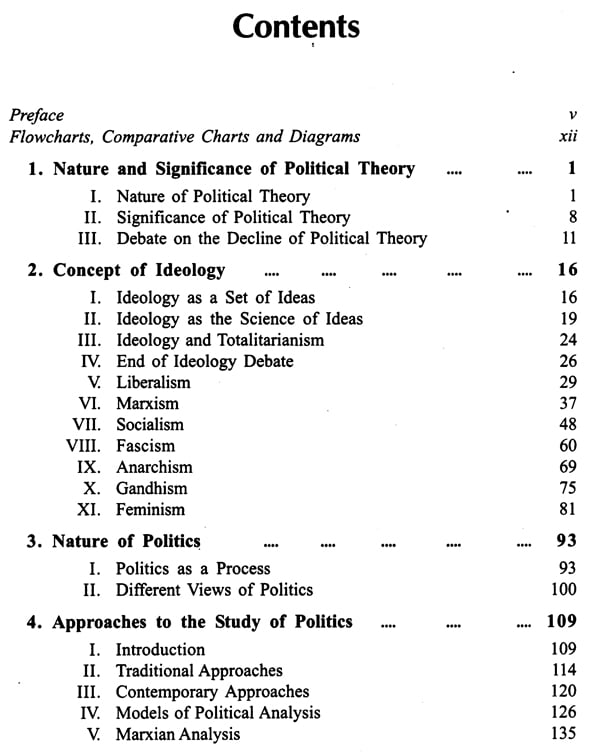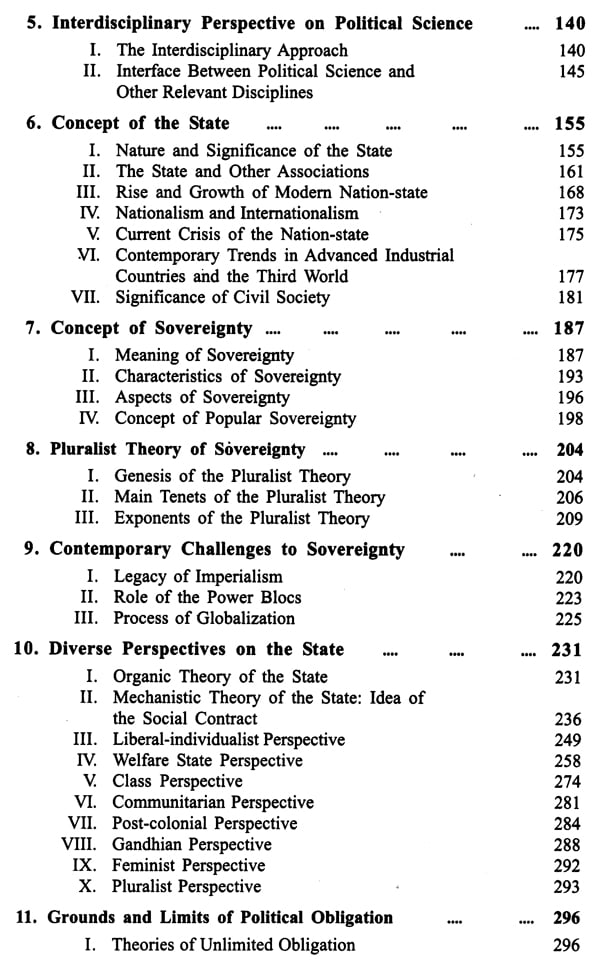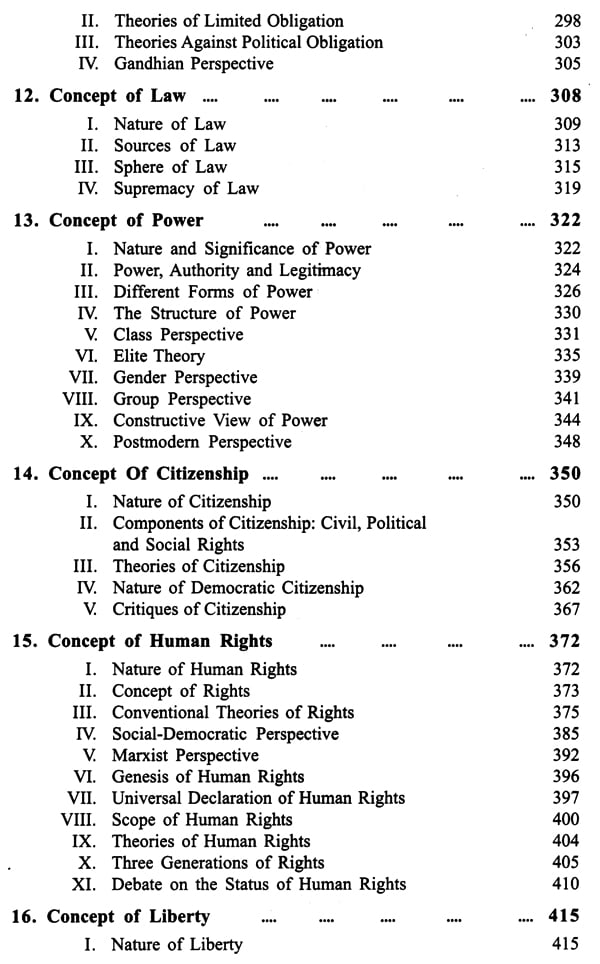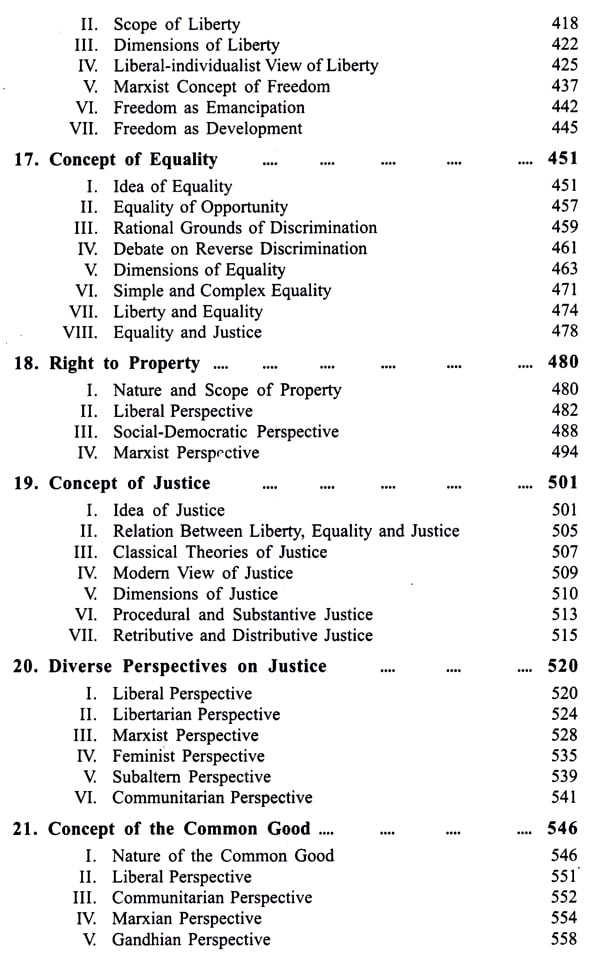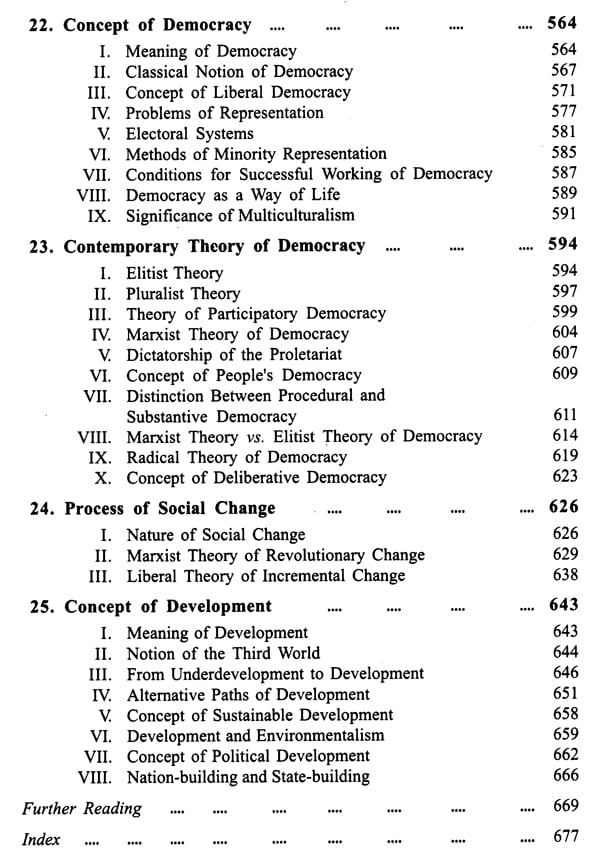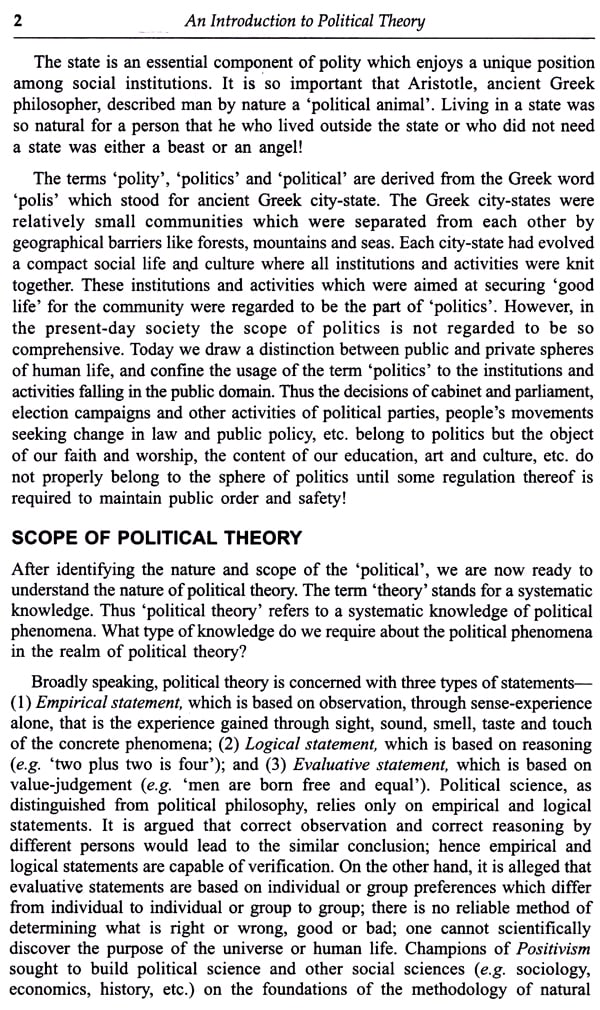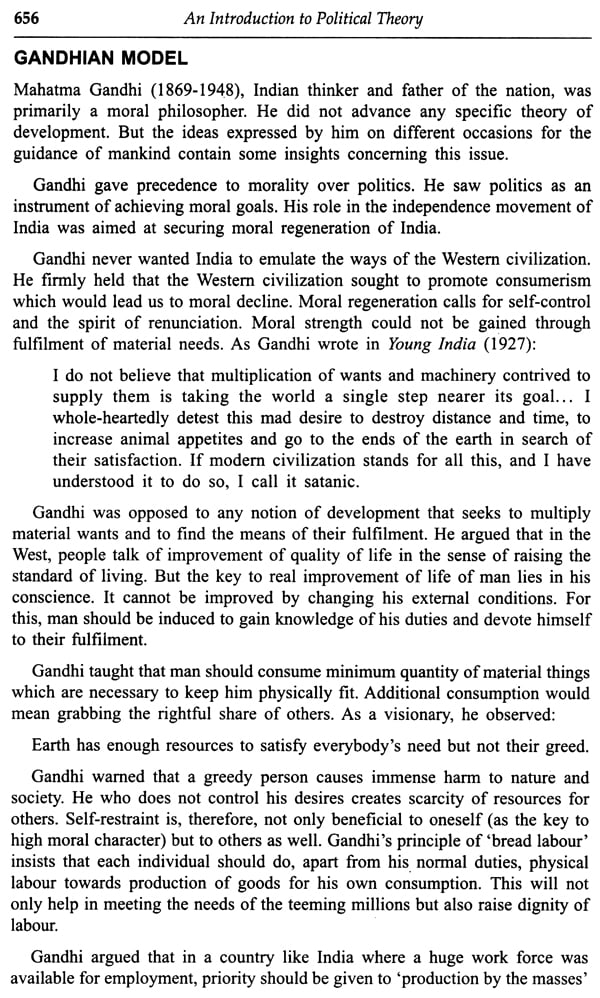
An Introduction to Political Theory
Book Specification
| Item Code: | NAT434 |
| Author: | O.P. Gauba |
| Publisher: | National Publishing House |
| Language: | ENGLISH |
| Edition: | 2022 |
| ISBN: | 9789388658331 |
| Pages: | 708 |
| Cover: | PAPERBACK |
| Other Details | 9.50 X 6.50 inch |
| Weight | 820 gm |
Book Description
This new edition of An Introduction to Political Theory examines a fairly wide range of issues concerning the ever-expanding field of political theory, in a multidisciplinary (historical-sociological-economic-philosophical-juristic) perspective. It elaborates the nature and significance of political theory, concept of ideology with a concise and critical discussion of major political ideologies, nature of politics and various approaches to its study including empirical, normative, behavioural, post-behavioural as well as interdisciplinary approach. It elucidates the concepts of the state and sovereignty with reference to the challenges of imperialism, colonialism, neo-colonialism, impact of globalization, grounds and limits of political obligation, various dimensions of law (including rule of law), power (along with authority and legitimacy) citizenship (including democratic citizenship), human rights, liberty (including freedom as emancipation), equality (including equality of opportunity), justice (including social justice) and the common good. Then it dwells on various models and theories of democracy (including participatory and deliberative democracy), indicating the significance of multiculturalism. Finally it gives a critical account of the theories of social change and development with special reference to the problems of underdevelopment, sustainable development and political development.
All important issues have been examined from various reference points including liberal, libertarian, Marxist, neo-Marxist, communitarian, elitist, pluralist, socialist, social-democratic, moralist, ecological, Gandhian, feminist and subaltern perspectives. The author has adopted an analytical and critical approach that inspires the readers to think for themselves rather than look for ready-made solutions.
Written in a concise and lucid style, the book contains self-instructional material with several unique, reader-friendly features such as a large number of flow charts, comparative charts, explanatory diagrammes, on-the-spot definitions, historical references and crisp quotations in boxes. It is particularly designed to cater to the needs of various Indian universities as well as various high-level competitive examinations including Civil Services Examination.
Dr. O.P. Gauba studied at D.A.V. College, Dehradun and the University of Delhi. He obtained B.A. Degree in Literature and Philosophy, M.A. Degrees in Sociology and Political Science from Agra University, and Ph.D. in Political Science from the University of Delhi. He taught in the University of Delhi from 1967 to 2004. Presently he is fully devoted to academic writing. His other important works include Western Political Thought, Indian Political Thought, Political Ideas and Ideologies, Contemporary Political Ideologies, Social and Political Philosophy, Reading Gandhi, Dimensions of Social Justice and Constitutionalism in a Changing Perspective, apart from a host of academic books and standard reference works in Hindi.
The present book An Introduction to Political Theory has been in circulation since 1981. In the meantime, its contents were revised, enlarged and upgraded, and its style of presentation was improved to make it reader-friendly and richer in content. The author is grateful to the academic community whose more than one generations have accepted and encouraged this modest attempt.
The purpose of this introductory work is to examine the major issues of the ever-expanding field of political theory from various reference points including liberal, libertarian, Marxist, neo-Marxist, communitarian, elitist, pluralist, socialist, social-democratic, moralist, ecological, Gandhian, feminist and subaltern perspectives. The issues examined here include the nature and significance of political theory, concept of ideology with a short description of major ideologies (liberalism, Marxism, socialism, fascism, anarchism, Gandhism and feminism), nature of politics and various approaches to its study such as empirical, nonnative, behavioural, post-behavioural as well as interdisciplinary approach, concepts of state and sovereignty, imperialism, colonialism, neo-colonialism, impact of globalization, grounds and limits of political obligation, various dimensions of law, power, citizenship; human rights, liberty, equality, justice, common good, democracy, development, under-development, sustainable development and political development, etc.
An attempt has been made to combine analytical and critical approaches to the various problems while avoiding a doctrinaire mode of thought. Any stand taken on an issue is sought to be substantiated by suitable arguments, illustrations and data. I make no claim to suggest a final solution to any problem of the present-day world. In my opinion, an author's job is adequately done if he is able to bring out the complexities of the problems and indicate the possible ways to find their answer, so that he inspires his readers to think for themselves rather than look for ready-made solutions!
For the seventh edition of this book, the entire text of the previous edition was given a facelift. In particular, the following topics were substantially revised and augmented: Ideology as a set of ideas; Ideology as a science of ideas; Neo-liberalism; Socialism; Post-behavioural Revolution; Marxian Analysis; Interdisciplinary Approach; State and Nation; Gandhian Perspective on the State-the Concept of Swonsj; Pluralist Perspective on the State; Gandhian Perspective on Political Obligation; Sources of Law; Power, Authority and Legitimacy; Gender Perspective on Power, Group Perspective on Power; Nature of Liberty; Freedom as Emancipation and Development; Idea of Equality; Liberty and Equality; Feminist Perspective on Justice; Significance of Multiculturalism; Pluralist Theory of Democracy; Development and Environmentalism; and Concept of Political Development.
Besides, the following new topics were inserted in appropriate contexts: Interface with Geography; Interface with Anthropology; Interface with Law; Postmodern Perspective on Power; Nature of Democratic Citizenship; Debate on the Status of Human Rights; and Amartya Sena Concept of Development-Oriented Freedom.
This new eighth edition represents a thoroughly revised, improved and updated version of all previous editions. Its reader-friendly features have been further refined and enhanced. It is hoped that the academic community will continue to receive this book with the same fervour as heretofore.
**Contents and Sample Pages**
